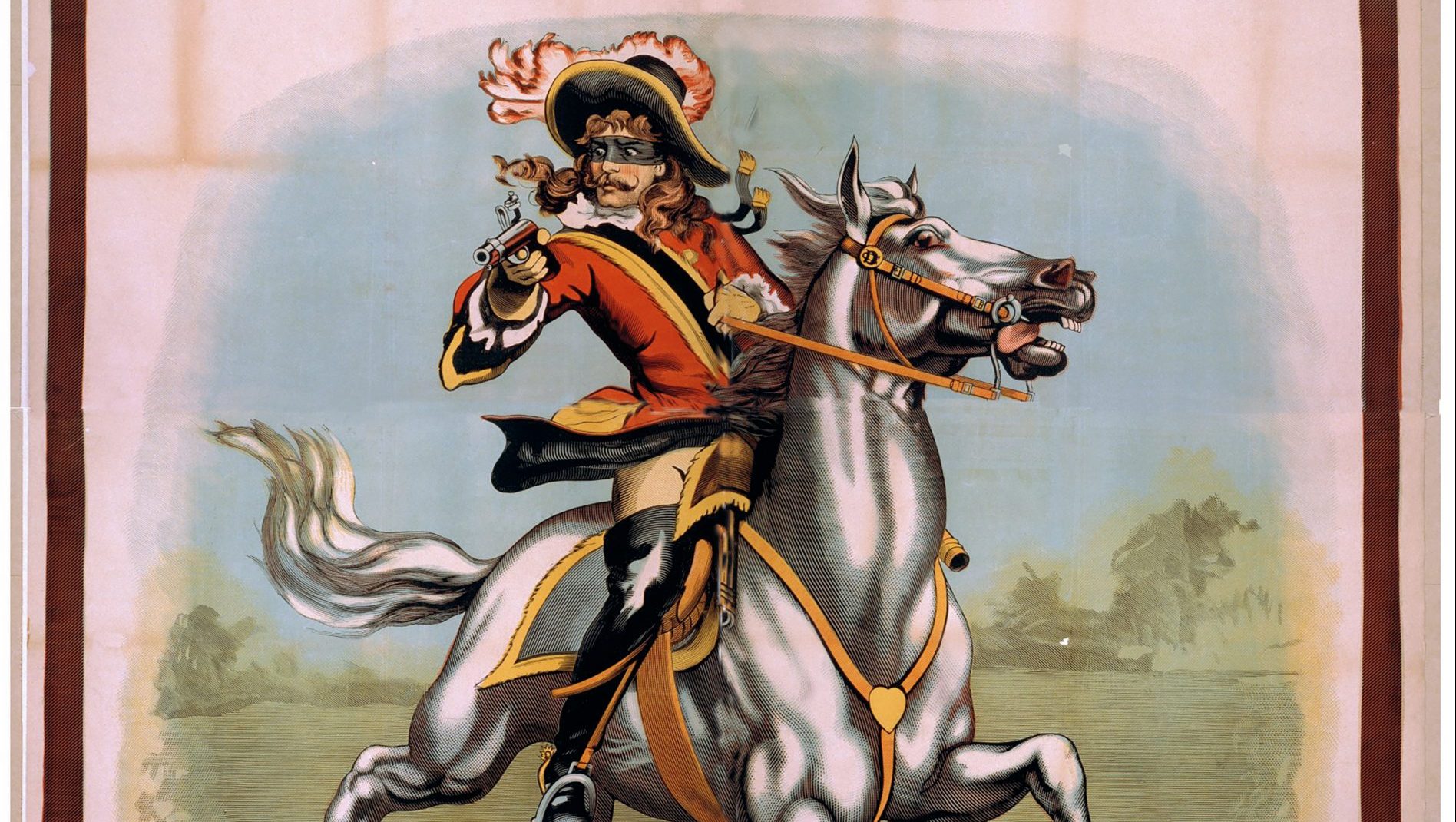The road from London to Bath could have been designed specifically to
benefit a 17th Century highwayman. Well-used by the wealthy travelling
between the capital and the prosperous spa town, the route featured long
stretches of remote countryside and woodland perfect for holding up coaches free of outside interference.
Travellers knew there was a significant risk of robbery, so the unnamed gentleman travelling west with his wife and a maidservant one summer day in the late 1660s would not have been surprised to hear hoofbeats circling his carriage prompting the coachman to bring his horses to a halt on a heath a few miles out of London.
When he heard the voice calling on him to open the carriage door the man might have had mixed feelings. The French accent indicated he was about to be robbed by the great Claude Duval, archetypal dandy highwayman and embodiment of the freewheeling, flamboyant, morally-ambiguous English Restoration.
The best-known of the nation’s stick-up merchants, Duval’s reputation was such that his victims were often left feeling almost flattered to have been relieved of their valuables by a man of such charm and refinement.
Immaculately dressed in a suit of green velvet, Duval was unfailingly
courteous and always keen to engage in conversation on cultural matters as he collected his booty before waving the coaches on their way with a raise of his hat, a broad smile and good wishes for the continuation of their journey.
Inside the carriage, the man quietly reassured the women that there were no incidents of Duval ever resorting to violence, let alone murder. If they were going to be held up on the highway by anyone, he whispered, better the Frenchman than anyone else.
Duval had been tipped off that this particular carriage was carrying £400
in cash, a sum worth in the region of £40,000 today. The bumper payday had understandably put Duval in high spirits, which is why this story stood out from the rest and has survived its protagonist by more than 350 years.
As Duval and his henchmen circled the carriage, one of the women – named in some accounts as Lady Aurora Sydney – did something unusual. Either to demonstrate she was not afraid or just to distract herself from the anxiety of the situation, she took out a flageolet (a popular woodwind instrument of the
time rather than a variety of bean) and began to play a popular tune.
Outside the carriage Duval stopped, cocked an ear, broke into a broad grin,
produced his own instrument from the folds of his tunic and proceeded, note-perfectly, to accompany her. After the final cadence, Duval rode up to the carriage door, opened it and addressed the gentleman inside.
“Sir,” he said, “your lady plays excellently and I doubt not but that she
dances as well. Will you let me have the honour to dance one courante with her upon the heath?”
“Sir,” came the nervous reply, “I dare not deny anything to one of your quality and good mind. You seem a gentleman and your request is very reasonable.” Duval dismounted and held out his hand to assist the woman’s descent.
“They danced,” says one 18th century account, “and here it was that Duval performed marvels; the best masters in London would not be able to show such footing as did he in his great French riding boots.”
To the accompaniment of Duval’s singing, the pair moved lightly across
the grass, the highwayman leading, the woman’s initial reluctance dissipating as she relaxed into the rhythm and Duval’s hummed tune inches from her ear.
The dance concluded, Duval bowed to the woman and escorted her, flushed
and out of breath, back to the coach. Once she was seated, he addressed her husband.
“Sir,” he grinned, “I fear you have forgot to pay the musician.”
“I have not,” came the reply as the man reached under the seat and produced the £400. Duval held the cash in his hand, thought for a moment, peeled off £100, thrust it inside his jacket and returned the rest.
“For the dance, sir,” he said, touching the brim of his hat, digging his heels into his horse and leading his accomplices back towards London.
As is often the case with historical figures who inhabit a hinterland between myth and reality, there are plenty of stories but few documented facts concerning Claude Duval.
Enough versions of the courante story exist to suggest it is based on a
real incident, a tale that demonstrates the affection afforded to Duval even among the moneyed classes on whom he preyed.
It was almost as if being robbed by the handsome, charming Frenchman could enhance one’s social standing.
Born in Domfront, a village in Normandy, the son of a miller, Duval set
off for Paris at the age of 14 in search of his fortune and found work as an errand boy at the St Esprit, a tavern and brothel in a part of Paris popular with royalist refugees from the English Civil War waiting for the monarchy to be restored.
When Charles II regained the throne in 1660, Paris emptied of its flamboyant
English aristocrats and Duval left with them for London in the service of Charles Stewart, 3rd Duke of Richmond.
By 1667, the 24-year-old had left the Duke’s employment, possibly because
he’d become a little too close to the Duchess of Richmond for the Duke’s liking, and soon racked up some alarming gambling debts.
This combination of circumstances prompted Duval to begin holding up coaches, combining his natural panache with the courtly manners he’d learned in service of the Duke.
His charm, good looks and French accent made Duval especially popular
with England’s society women, something that irked their menfolk far
more than his idiosyncratic brand of larceny.
When he relieved the Master of the Royal Buckhounds of £50 outside
Windsor and left him tied to a tree for several hours, Duval’s card was truly marked.
On Christmas Eve 1669 he was seen in the Hole-in-the-Wall tavern in
Chandos Street, London, celebrating a particularly lucrative hold-up.
The bailiffs were tipped off. Too drunk to resist, he was captured and locked up in Newgate Prison where, for the two weeks before his trial, he was visited by a stream of besotted society women.
Convicted of six charges of robbery, Claude Duval was hanged at Tyburn on a
cold, misty January morning in 1670.
Addressing the gathered crowd, he made sure to thank profusely the “fair
English ladies” for their unwavering devotion.
One posthumous account of his life lamented, “that so gifted and elegant a
ruffian as this should, in an age of gaiety and fine manners, when morality was never considered, have met his fate by having a cart pulled away from under him, is, to all right-thinking people, a melancholy reflection on the ingratitude of mankind”.
This sums up how a dash of gallic charm, a nifty pair of dancing feet and
a hefty dose of élan can turn even an audacious robber into a hero of the age.




